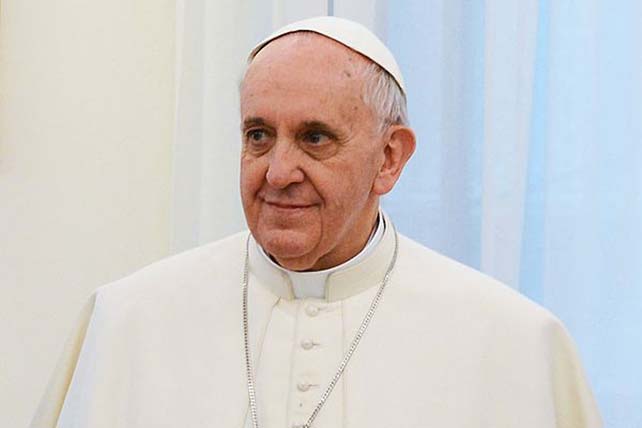“This is ideological colonization,” Francis told reporters. “They introduce an idea to the people that has nothing to do with the people. With groups of people yes, but not with the people. And they colonize the people with an idea which changes, or means to change, a mentality or a structure.”
Inspiring the pope’s vision is one of his favorite books, “Lord of the World,” a 2016 work by the Rev. Robert Hugh Benson, a British Catholic priest who had converted from the Church of England. In the novel’s dystopian future of the 2000s, global powers impose what Francis has called an “imperial form of colonization” that leads to the end times.
As archbishop, Bergoglio often opposed the Argentine government led by President Nestor Kirchner and Kirchner’s successor (and wife), Cristina Fernández de Kirchner, for what he saw as their efforts to promote abortion and gay marriage, but also policies that in Francis’ view were detrimental to the poor.
Francis shared his opposition with a group of Argentine intellectuals who sought to protect South America’s local cultures and traditions against globalization. Though this focus put them on the side of the poor against the elites, the thinkers tried to offer an alternative to the Marxist-inspired liberation theology that was gaining ground across the continent.
Among Francis’ models was Uruguayan author Alberto Methol Ferré, whom Bergoglio praised for his ability to navigate the tension between the abstract ideals of international organizations such as the European Union, the United Nations and the International Monetary Fund and the day-to-day concerns of local communities.
“His acute and creative thought was able to gaze with prospective at the roots as well as the utopias, which converted him to a man faithful to the reality of peoples,” Bergoglio said in 2010, at an event commemorating Methol Ferré’s death a few months before.
RELATED: Ed Stetzer: ‘Cancel’ the Salvation Army? I Think Not.
While Francis is often labeled a progressive, his defense of local peoples and traditions against ideological colonization is among the most conservative aspects of his worldview. It highlights how, despite his openness toward LGBTQ issues, divorced and remarried couples and other faiths, Francis remains a staunch defender of traditional Catholic principles concerning unborn life and the family.
In a document that was leaked in December, the European Commission advised its officials to refrain from using the word “Christmas” and to use gender-neutral language. Francis compared the commission to a dictatorship.
But he also criticized the document as “anachronistic,” a point he echoed in his speech to the diplomats last week. Ideological colonization, in Francis’ view, is blinded by its present-mindedness. It is “constrained to deny history,” he told the diplomats, “or, worse yet, to rewrite it in terms of present-day categories.”
Nonetheless, the pope’s caution to international organizations was driven by the faith he has in their power to make change. He believes that they are necessary toward achieving peace and addressing today’s increasingly global challenges.
“The pope is sincerely worried about the fate of international organizations,” Borghesi said.
Traina said there is “irony” in Francis’ critique of ideological colonization efforts, when historically the “church has been not only deeply engaged, but in many ways at the forefront in the effort to do this.” She cited the colonization of the Americas, when the church could be accused of attempting to impose a “single thought,” Traina said.
Even within the Catholic Church itself there have been efforts to “cancel” thoughts and ideas that do not reflect the Vatican’s interpretation of doctrine.
The pope appears to be aware of the church’s complicity in ideological colonization. To address it, he initiated the “Synod on Synodality,” a three-year consultation of Catholic parishes, dioceses and episcopal conferences aimed at overhauling the top-down structure that has defined Catholicism for decades. The ambitious program will end with a summit of bishops at the Vatican in 2023.
“Within the church this openness of communication has been really nicely signaled and reaffirmed by Pope Francis in his use of synods,” said David DeCosse, director of religious and Catholic ethics at Santa Clara University.
In effect, the synod is intended to do for the church what Francis is asking of international organizations. The “local church must return to expressing its own voice and must do so in concert with the universal church,” Borghesi explained.
But local communities must also listen to the global conversation, lest they risk falling into populism and nationalism.
“The particular and the universal need one another,” Borghesi said. “Dialogue does not mean losing my identity, but to build my identity I need the identity of the other.
“History, roots, the home, the family” are essential, he said, but they cannot thrive by “pretending that the world doesn’t exist.”
This article originally appeared here.

